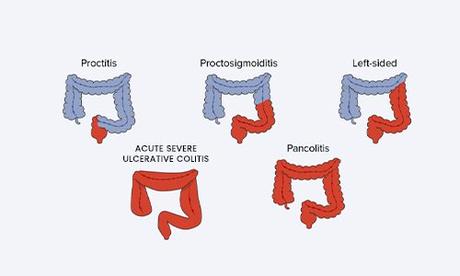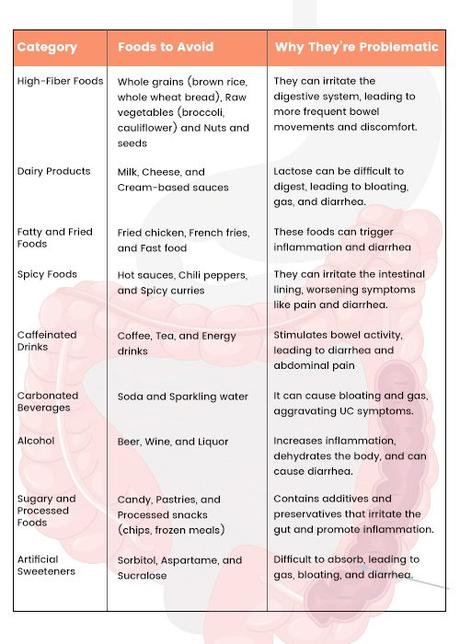Have you ever heard of Ulcerative Colitis (UC)? If you're new to the term, you're not alone. It is a chronic inflammatory bowel disease (IBD) that specifically targets the colon (large intestine) and rectum. The inner lining of the colon becomes inflamed, resulting in painful ulcers and sores. This condition is often confused with Crohn's disease , another form of IBD, but UC exclusively affects the colon, while Crohn's can impact any part of the digestive tract.
Types of Ulcerative Colitis: Which One Do You Have?

Did you know there are different types of ulcerative colitis? The condition isn't the same for everyone. The classification depends on where inflammation occurs in the colon. Here's a quick look:
- Ulcerative Proctitis: Inflammation is limited to the rectum. This is the mildest form of UC.
- Proctosigmoiditis: Affects the rectum and the sigmoid colon, the lower end of the colon.
- Left-Sided Colitis: Inflammation extends from the rectum up the left side of the colon.
- Pancolitis: Involves inflammation of the entire colon.
- Acute Severe Ulcerative Colitis: A rare form affecting the entire colon with severe symptoms.
Knowing your specific type can help in tailoring treatment. But why does UC develop in the first place? Let's take a deeper dive into the causes.
What Causes Ulcerative Colitis
Unfortunately, the exact cause of UC remains unclear, but researchers believe it's a combination of factors such as:
1. Immune System Dysfunction

One major theory is that UC results from an abnormal immune response. Normally, the immune system defends the body against harmful invaders. In UC, the immune system mistakenly attacks the healthy tissues of the digestive tract, causing inflammation.

Do you have a family member with UC or another inflammatory bowel condition? Genetics plays a significant role in determining your risk. If close relatives have UC, your chances of developing the disease may increase.
3. Environmental Factors

Exposure to environmental triggers like pollution, diet, and even certain medications (like nonsteroidal anti-inflammatory drugs) could increase the likelihood of developing UC.
4. Stress and Lifestyle

While stress doesn't directly cause UC, it can worsen symptoms. The mind-gut connection is very real-stress can intensify the severity of the disease.
Next, let's look at how this condition manifests in the body. How can you tell if you might have UC? Here's what you need to know about the symptoms.
Symptoms of Ulcerative Colitis: When Should You Worry?

Symptoms of UC can range from mild to severe and often come and go in waves. This fluctuation is referred to as periods of remission and flare-ups. Do any of these sound familiar to you?
- Persistent Diarrhea: One of the hallmark signs of UC is chronic diarrhea, often accompanied by blood or pus in the stool.
- Abdominal Pain and Cramping: This discomfort typically centers around the lower abdomen and may intensify during flare-ups.
- Rectal Bleeding: Passing blood is often one of the first alarming symptoms that prompt people to seek medical advice.
- Fatigue and Weakness: When your body is constantly fighting inflammation, it uses up energy reserves, leaving you feeling drained.
- : Since UC affects your digestion, it can lead to unintentional Weight Lossweight loss over time.
If you experience any of these symptoms, it's essential to see a healthcare provider. But how exactly do doctors diagnose Ulcerative Colitis? Let's find out.
How is Ulcerative Colitis Diagnosed? Tests and Procedures

The journey to diagnosing UC involves multiple steps, including a thorough medical history, physical examination, and specialized tests. Here's what to expect:
- Blood Tests to check for signs of inflammation or anemia, which is common in UC patients.
- Stool Tests help rule out infections or parasites that might cause similar symptoms.
- Colonoscopy is the most definitive test for UC. A long, flexible tube with a camera is inserted into the rectum to examine the entire colon visually. Doctors can also take tissue samples (biopsies) to confirm the diagnosis.
- Imaging Tests such as CT scans or X-rays give a clearer view of the inflammation.
Treating Ulcerative Colitis: What Are Your Options?

Although there is no cure for UC, treatments can help you manage your symptoms and achieve long-term remission. Treatment plans vary depending on the severity of the disease, but here are the main approaches:
1. Medications
Anti-inflammatory drugs (like corticosteroids and aminosalicylates) are often the first line of defense. Immunosuppressants may also be prescribed to prevent the immune system from attacking the colon.
2. Biologics
These are advanced medications that target specific proteins involved in inflammation, providing relief for people with moderate to severe UC.
In extreme cases where medications fail to control symptoms, surgery to remove part or all of the colon may be recommended. While this sounds intimidating, surgery can often lead to a cure or significantly improve quality of life.
But what about home remedies? Are there ways to soothe symptoms at home? Absolutely!
Home Remedies to Soothe Ulcerative Colitis Symptoms

While medical treatments are crucial, some home remedies can help ease UC symptoms. Wondering how you can get some relief without leaving your home? Try these tips:
- A low-residue diet, which minimizes fiber intake, may help reduce the frequency of bowel movements.
- Diarrhea can lead to dehydration, so it's essential to drink plenty of fluids throughout the day. Herbal teas or broths can be especially soothing.
- Probiotics can support your gut health. You can take them as supplements or find them naturally in yogurt or fermented foods like kefir.
- Yoga, meditation, and breathing exercises can help manage stress, which is a known trigger for UC flare-ups.
- Placing a warm compress or heating pad on your abdomen can help alleviate some of the pain and cramping associated with UC flare-ups.
It's crucial to keep in mind that while these remedies can provide some relief, they should complement, not replace, your prescribed treatments.
Worst Foods for Ulcerative Colitis: What to Avoid
This table offers a clear breakdown of each food category, specific examples, and the reasons why they're best avoided for those with Ulcerative Colitis.

Recent Research and Future Directions
Are there new treatments or breakthroughs on the horizon? Research into ulcerative colitis is ongoing, and several promising developments are in the works:
- Personalized Medicine is used to tailor treatment to the individual's genetic profile.
- Stem Cell Therapy is recommended by healthcare providers to repair damaged tissues in the colon.
- Microbiome Research is used to study the gut microbiome's role in UC and how modifying it could lead to new treatments.
- AI in Treatment: Yes! Artificial intelligence is being used to predict flare-ups and optimize treatment plans.
- Research into environmental noise and its potential to exacerbate UC symptoms.
Staying informed about these developments can help you manage your condition better.

Despite his severe UC, JFK served as the 35th President of the United States, showing that the condition doesn't have to limit your potential.
Conclusion
Ulcerative colitis may be a lifelong condition, but with the right knowledge, treatment, and lifestyle adjustments, it is entirely manageable. Whether you're newly diagnosed or have been living with UC for years, remember that support and resources are available to help you on your journey. If you have any questions or need further information, don't hesitate to reach out to your healthcare provider. Your path to a healthier, balanced life starts today!

Ashley completed her degree with nutrition as her major. She loves sharing her knowledge with others and playing with words. After struggling for almost a year to find a job that could make her feel lively, she ended up as a freelance writer. Ashley writes health-related blogs and articles. She makes sure that her works always stand unique and are useful for everyone. Ashley is also a YouTuber who shares health-related videos. She knows the value of the right information and how it can be beneficial to others. Therefore, her only motto is to provide accurate information. If Ashley sounds like that neighbor who you can ask for health tips, take a look at her works.

